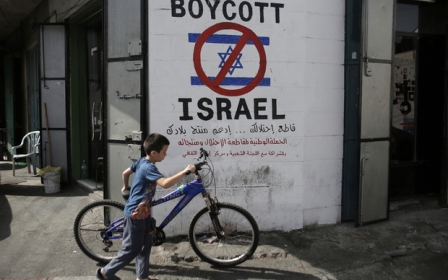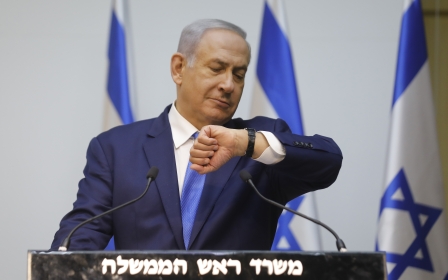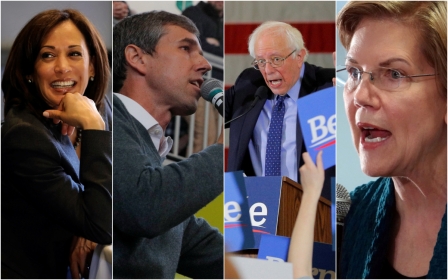'A racist against a war criminal': Israeli elections bring no hope to Palestinians in US

Millions of Israeli citizens are headed to the polls in a contest that largely comes down to the long-dominant Likud Party of Prime Minister Benjamin Netanyahu and Israeli military leader Benny Gantz's new Blue and White Party.
Yet while many eyes will be on Tel Aviv as the results trickle in later tonight, across the Atlantic Ocean, Palestinian-Americans are largely unfazed by the elections.
Whoever wins, many Palestinians in the United States say, the result will be the same: a continuation of Israel's brutal military occupation.
"Regardless of the outcome, the upcoming Israeli election is unlikely to produce any meaningful change to Israeli policy towards the Palestinians," Omar Baddar, deputy director at the Arab American Institute, told Middle East Eye.
If Netanyahu's hard-right party wins the country's 21st parliamentary elections, the longstanding Israeli leader is expected to form a coalition with parties even further to the right than Likud. A victory for Netanyahu would also give him a fifth consecutive term as prime minister.
New MEE newsletter: Jerusalem Dispatch
Sign up to get the latest insights and analysis on Israel-Palestine, alongside Turkey Unpacked and other MEE newsletters
Meanwhile, Gantz, the Israeli army's former chief of staff, is seen by many Israelis as a more moderate candidate - and he has presented the most serious political challenge to Netanyahu's rule in recent memory.
But Gantz's policies are "equally ugly and distasteful", said Baddar, who pointed to the politician's endorsement of Israel's separation wall and a recent call for the use of targeted killings in the Gaza Strip.
"These attitudes are transparently racist and do not reflect any willingness to see Palestinians as an equal people deserving of their rights, which is why the election will likely produce no shift in policy towards Palestinians, however consequential it may be for Israeli society," Baddar said.
George Bisharat, a Middle East expert and legal professor at UC Hastings College of Law, echoed those comments.
"The Israeli elections pit a racist against a war criminal, and thus serve as a barometer of politics in that country, which has shifted ever rightward since 1967," Bisharat said, referring to the war after which Israel occupied the West Bank and Gaza Strip.
"As to which candidate prevails, there seems to be little significant difference between them in their attitudes and approach to Palestinians. So while the direction of the elections is of concern, the outcome is not," Bisharat told MEE in an email.
Trump's 'total support' for Israel
The Palestinian community's indifference to the Israeli vote may also be traced, at least in part, to Donald Trump's unequivocal embrace of Israel, said Khalil Jahshan, a political analyst and executive director of Arab Center Washington DC.
While Washington's support for the country is certainly not new, the current US president has made absolute support for Israel - as well as Netanyahu's hardline, right-wing policies - a central pillar of his administration's plans in the region.
Most recently, the US president recognised Israel's occupation of the Syrian Golan Heights, a decision that was welcomed by Netanyahu himself - but few else. "Israel has never had a better friend than you," the Israeli premier told Trump from the White House on 25 March.
'Other than giving them the keys to the White House, I don't know what is left to give'
- Khalil Jahshan, Arab Center Washington DC
In contrast, the move garnered condemnation from world leaders, human rights groups and other advocates. Many said they feared the decision meant Washington would have no qualms with recognising Israeli claims to part, or all, of the occupied Palestinian territories, as well.
The Golan decision also came after Trump recognised Jerusalem as Israel's capital, and moved the US embassy to the city. He also cut American aid to Palestinian refugees and shuttered the Palestine Liberation Organisation's office in Washington since he moved into the White House.
With Trump unlikely to backtrack on his "total support" for Israel, Jahshan said that it's clear to Palestinians that they will lose, no matter who gets to form the next Israeli government.
"[Trump] has given Israel more than it even wants at this time from the US, and he brags about being the most forthcoming president vis-a-vis Israel," he said.
"He has changed decades-long US policy … with regards to Jerusalem, refugees, the two-state solution. Other than giving them the keys to the White House, I don't know what is left to give."
Shifting the status quo
While Amer Zahr, a Palestinian-American comedian and adjunct professor at the University of Detroit Mercy School of Law, agreed that the Israeli elections are not of great concern for Palestinians in the US, he said the community has reasons for optimism.
He pointed to pro-Israel lobby group AIPAC's apparent loss of total, bipartisan support as one example of the positive changes taking place in Washington.

Last month, several top Democratic Party presidential contenders chose not to attend the group's annual conference in the US capital, as the party's progressive base has increasingly shifted the discourse on Israel.
"Everyone is talking about the changing American landscape that is getting away from the status quo of automatic submission to AIPAC and pro-Israel forces," Zahr told MEE.
Hope among Palestinian-Americans also stems from the recent election of Ilhan Omar and Rashida Tlaib, who in January became the first two members of the US Congress to ever openly support the Boycott, Divestment and Sanctions (BDS) movement for Palestinian rights, Zahr said.
Tlaib is also Palestinian-American and has been widely embraced by the Palestinian community in the US and abroad.
"We've seen now that it's really a house of cards. It's a very fragile power that the [Israeli lobby] holds," Zahr said.
"Two congresspeople who have challenged AIPAC and the status quo," he said, referring to Tlaib and Omar, "And ... look at the sort of seismic shift that has happened and the debate that has ensued in the Democratic Party.
"Palestinians have been very, very uplifted by that in America."
Middle East Eye delivers independent and unrivalled coverage and analysis of the Middle East, North Africa and beyond. To learn more about republishing this content and the associated fees, please fill out this form. More about MEE can be found here.





